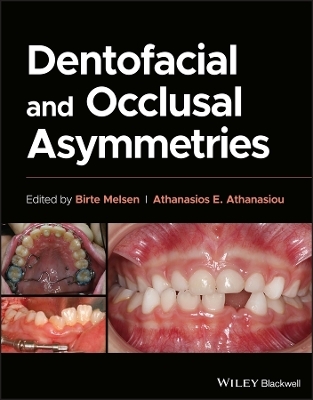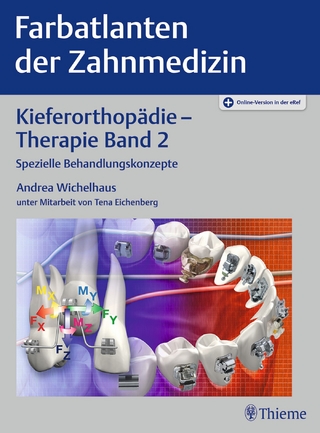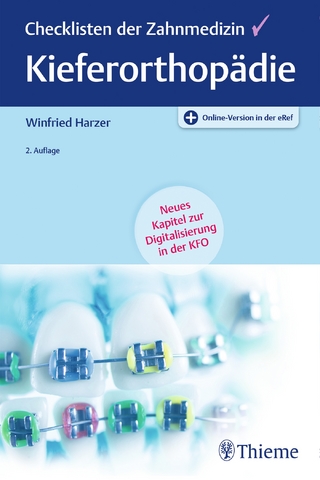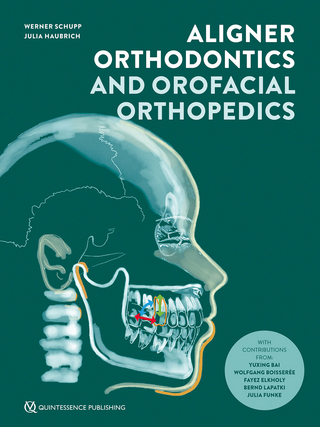
Dentofacial and Occlusal Asymmetries
Wiley-Blackwell (Verlag)
978-1-119-79481-3 (ISBN)
- Treatment approaches: interceptive, tooth movements, goal-oriented biomechanics and jaw repositioning
- Treatment principles: dentofacial orthopedics, camouflage and orthodontic-surgical treatment
- Localization and problem list: medical and dental history, clinical examination, dental cast analysis and radiographic/imaging assessment
- Medical, social and psychological aspects: growth disorders and helping children and their families with facial differences
Written by a team of renowned experts in the field, »Dentofacial and Occlusal Asymmetries« will serve as an invaluable resource to postgraduates in orthodontic, pediatric dentistry and oral and maxillofacial surgery programs as well as orthodontists, pediatric dentists, pediatricians and oral and maxillofacial surgeons aiming for optimal results in the diagnosis and management of these complex malocclusions and dentofacial deformities.
Birte Melsen is the past President of European Orthodontic Society in 2004 and has made significant contributions to the field of orthodontics with her research, publishing around 350 papers in scientific journals on topics related to anchorage (orthodontics) and adult orthodontics. She is currently an orthodontist from Denmark.
Athanasios E. Athanasiou, Executive Dean and Professor of Orthodontics, European University Cyprus, Cyprus; Honorary Professor of Orthodontics, Mohammed Bin Rashid University of Medicine and Health Sciences, UAE.
List of Contributors xiv
1 Introduction 1
Birte Melsen and Athanasios E. Athanasiou
References 3
Part I Etiology 5
2 The Etiology of Dentofacial and Occlusal Asymmetries – An Overview 7
Birte Melsen
Introduction 7
Congenital 7
Postnatally 8
References 14
3 Congenital 15
3.1 Distortion/Malformation 16
Pertti Pirttiniemi
Etiology – Definition 16
Craniosynostosis 16
Plagiocephaly 17
Muscular Torticollis 17
Developmental Dysplasia of the Hip 18
Scoliosis 18
Hemifacial Hyperplasia 18
References 19
3.2 Syndromes and Rare Diseases with Asymmetry in the Craniofacial and Dental Regions 21
Hans Gjørup and Dorte Haubek
Syndromes and Rare Diseases 21
Unilateral Overgrowth of Craniofacial or Dental Structures 22
Unilateral Underdevelopment of Craniofacial or Dental Structures 25
References 33
4 Acquired 37
4.1 Acquired Dentofacial Deformity and Asymmetry 38
Peter B. Stoustrup and Thomas Klit Pedersen
Introduction 39
The Temporomandibular Joint (TMJ) and Its Association with Asymmetric Dentofacial Development 39
Dental Occlusion and Acquired Skeletal and Dental Asymmetries 40
Acquired Dentofacial and Dental Asymmetries 40
Autoimmune Conditions 41
Skeletal Growth Diseases 44
Conditions with Skeletal Undergrowth 44
Conditions with Skeletal Overgrowth 45
Soft-tissue Conditions 46
Temporomandibular Joint (TMJ) Conditions 46
Temporomandibular (TMJ) Disc Displacement (Internal Derangement) 47
Management of Acquired Dentofacial Deformity and Asymmetry 47
Conclusion 50
Acknowledgment 50
References 51
Part II Localization and Problem List 53
5 Examination of Special Features in Patients with Dentofacial and Occlusal Asymmetries 55
Athanasios E. Athanasiou and Birte Melsen
Introduction 55
Head Posture 56
Functional Assessment 58
Photographic Assessment 61
Conclusion 61
References 67
6 Imaging: Craniofacial Asymmetries 69
David C. Hatcher and Vidhya Venkateswaran
Introduction 69
Asymmetry 70
Differential Diagnosis and Decision Tree for a Craniofacial Asymmetry 70
Imaging for Asymmetry 70
Analysis 71
Overall Regional Changes Associated with the Developmental Onset of TMJ Disorders 72
Common Disorders and Associated Local and Regional Changes 74
Conclusions 78
References 81
7 Cephalometric Radiographic Assessment of Facial Asymmetry 82
Guilherme Janson and Aron Aliaga-Del Castillo
Introduction 82
Radiographic Methods for Diagnosis of Asymmetry 82
Concluding Remarks 89
References 89
8 EMG and Ultrasonography of Masticatory Muscles 91
Stavros Kiliaridis
Introduction 91
Understanding the Functional Profile of the Muscle 91
Clinical Methods to Record Masticatory Muscles Functional Capacity 92
Posterior Crossbite with Functional Shift. Effects on Masticatory Muscles? 95
References 96
9 Localization and Problem List – 3-D Face Reconstruction 99
Karine Evangelista, Camila Massaro, Antonio Carlos de Oliveira Ruellas, and Lucia H. Soares Cevidanes
Introduction 99
Facial Asymmetry Diagnosis and Complementary Exams for Facial Asymmetry Localization 100
Image Analysis in CBCT Scans for Skeletal Asymmetry 102
Head Orientation 102
Scroll Through All Cross-Sectional Slices 102
Assessment of the 3D Rendering Viewing from Different Perspectives 104
List of Problems in Skeletal Craniofacial Asymmetries Through 3D Assessment 104
Zygomatic and Maxillary Unilateral Hypertrophy 105
Sinus and Maxillary Hypoplasia 105
Unilateral Condylar Hyperplasia 107
Unilateral Condylar Resorption 109
Craniofacial Macrosomia 110
Asymmetry Localization and Quantification 110
Mirroring and Superimposition 111
Quantification 113
Determining the Asymmetry Directions 114
Final Considerations 114
Acknowledgments 114
References 114
Part III Management 117
10 Treatment Approaches 119
10.1 Very Early Treatment of Dentofacial Asymmetries: Why, When, and How? 120
Ute E.M. Schneider-Moser and Lorenz Moser
Introduction 120
Etiology 121
Diagnostic Evaluation 121
Very Early Treatment for Unilateral Posterior Crossbite with Class I, II, III Malocclusion 123
What if a Class II Subdivision Develops After Early Crossbite Correction? 132
What About Stability of Very Early Crossbite Correction? 141
Summary 141
References 142
10.2 Tooth Movement and Goal-oriented Mechanics in the Treatment of Patients ExhibitingAsymmetry 144
Bhavna Shroff, Steven M. Siegel, Steven J. Lindauer, and Birte Melsen
Introduction 144
Diagnosis – Problem List 145
Molar Rotation (First Order) 147
Molar Tipping (Second Order) 149
Posterior Crossbite (Third Order) 150
Early Loss of Mandibular Deciduous Canines 150
Treatment 152
Correction of Unilateral Molar Rotation 152
Current Mechanics Used to Correct a Class II Subdivision Malocclusion 153
Unilateral Tip-back Mechanics 156
Conclusion 158
References 159
11 Treatment Principles 161
11.1 Dentofacial Orthopedics in the Management of Hemifacial Microsomia and Nager Syndrome Cases 162
Birte Melsen and Athanasios E. Athanasiou
Introduction 162
Case Reports 163
Discussion 171
Conclusion 173
References 173
11.2 Rational Diagnosis and Treatment of Dental Asymmetries 175
Joseph Bouserhal, Nikhillesh Vaiid, Ismaeel Hansa, Zakaria Bentahar, Lea J. Bouserhal, and Philippe J. Bouserhal
Introduction 175
Classification of Dental Asymmetries 176
Diagnosis of Dental Asymmetries 176
Management of Posterior Dental Asymmetries 179
Management of Anterior Dental Asymmetries 181
Conclusions 195
Acknowledgment 195
References 195
12 Orthodontics, Maxillofacial Surgery, and Asymmetries 196
12.1 Dental Arch Shape in Relation to Class II Subdivision Malocclusion 197
Birte Melsen and Padhraig S. Fleming
Introduction 197
Dental Arch Form 197
Case 1 198
Case 2 199
Discussion 199
References 207
12.2 Asymmetric Application of Lingual Arches 208
Kwangchul Choy
Introduction 208
Color Code of the Wire and Force System 209
Shape-driven Concept 209
Force-driven Concept and Definition of Shapes 210
Unilateral Expansion 210
Simulation of Force System 211
Unilateral Tip-back and Unilateral Tip-forward 214
Summary 216
References 219
12.3 Skeletal Anchorage for the Correction of the Canted Occlusal Plane 220
George Anka and Athanasios E. Athanasiou
Treatment of the Canted Occlusal Plane 220
Biomechanics for the Correction of the Canted Occlusal Plane 225
The Trans-Palatal Arch (TPA) Plus Hooks 225
Details of TPA Plus Hooks 231
The Propeller 237
The Ulysses and the Anka-Jorge Plate 240
Extrusion 247
Conclusion 251
References 254
12.4 Managing the Class II Subdivision Malocclusion with Extraction Camouflage: Case Reports 256
Cesare Luzi and Emese Szabò
Introduction 256
Case 1 256
Case 2 259
Conclusions 264
References 268
12.5 The Use of Aligners for Correction of Asymmetries 269
Eugene Chan and M. Ali Darendeliler
Introduction 269
Dental Corrections (Non-extraction Therapies) 270
Dental Corrections (Extraction Therapies) 285
Skeletal Anchorage Therapies 294
Surgical Intervention 309
Conclusions 321
References 328
12.6 TMJ Conditions Causing Facial Asymmetry: Diagnosis and Treatment 329
Larry M. Wolford
Introduction 329
Overdevelopment 329
Unilateral Facial Under-development 335
Adolescent Internal Condylar Resorption (AICR) 336
Reactive Arthritis 338
Trauma 339
TMJ Ankylosis 339
Hemifacial Microsomia (HFM) 341
Connective Tissue/Autoimmune Diseases (CT/AI) 344
References 346
12.7 Distraction Osteogenesis in Maxillofacial Surgery 351
Ioannis Iatrou and Nadia Theologie-Lygidakis
Introduction 351
Biological Basis 351
Staging of Distraction Osteogenesis 352
Indications for Distraction Osteogenesis 352
The Distractors and Their Function 353
Preoperative Patient Evaluation 353
Surgical Procedure 354
Postoperative Procedure – Activation of the Device 358
Complications 359
Orthodontic Collaboration 361
Distraction Osteogenesis and/or Conventional Orthognathic Surgery 362
Conclusion 362
References 362
12.8 Maxillo-mandibular Growth in Hemifacial (or Craniofacial) Microsomia 364
Maria Costanza Meazzini di Seyssel
Introduction – Clinical Appearance 364
Craniofacial Growth in Hemifacial Microsomia 364
Long-term Growth After Distraction Osteogenesis of the Mandible 368
Long-term Results After Costochondral Graft in Growing Patients with Hemifacial Microsomia 368
Clinical and Prognostic Differences in the Orthopedic and Surgical Treatment of Hemimandibular Hypoplasia in Hemifacial Microsomia versus Pseudo-hemifacial Microsomia (or Condylar Coronoid Collapse Deformity) 371
References 377
12.9 Special Treatment Considerations of Face Asymmetries 380
Giampietro Farronato
Introduction 380
Diagnosis 380
Categories of Asymmetry 384
Special Treatment Considerations 393
References 404
12.10 The Vertical Component of Asymmetry: Etiology and Treatment 406
Joseph G. Ghafari
The Three-dimensional Nature of Asymmetry 406
Interaction between Maxillary and Mandibular Asymmetries 407
Unimaxillary Vertical Asymmetry not Affecting the Symmetry of the Other Jaw 411
Conclusion 416
References 416
12.11 Helping Children and Their Families with Facial Differences – Patient Centered Outcomes and Experiences 418
Eleftherios G. Kaklamanos
Introduction 418
The Face as a Functional Structure and as an Element of Identity 419
The Facial Difference from the Patient’s Perspective 420
The Facial Difference from the Family Perspective 422
Psychosocial Support for Children and Families 422
References 423
Index 429
| Erscheinungsdatum | 26.08.2023 |
|---|---|
| Verlagsort | Hoboken |
| Sprache | englisch |
| Gewicht | 1520 g |
| Einbandart | gebunden |
| Themenwelt | Medizin / Pharmazie ► Allgemeines / Lexika |
| Medizin / Pharmazie ► Zahnmedizin ► Kieferorthopädie | |
| ISBN-10 | 1-119-79481-1 / 1119794811 |
| ISBN-13 | 978-1-119-79481-3 / 9781119794813 |
| Zustand | Neuware |
| Informationen gemäß Produktsicherheitsverordnung (GPSR) | |
| Haben Sie eine Frage zum Produkt? |
aus dem Bereich


